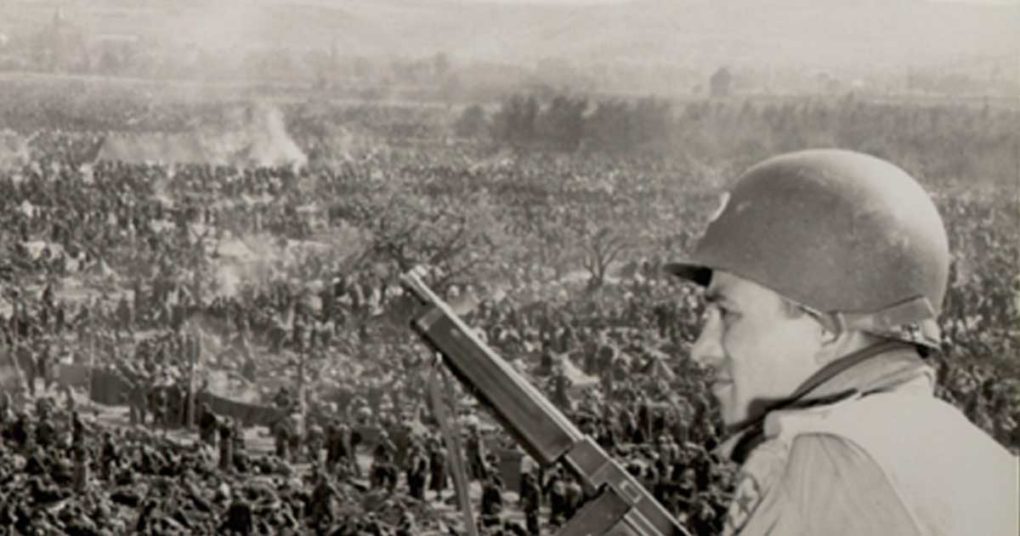In our March 2019 issue, we published a review by Fr Conor Donnelly of the book Other Losses by James Bacque. Historian Fr Peter Damian-Grint offers a different perspective on that work.
James Bacque’s book Other Losses caused a scandal when it was first published thirty years ago. Bacque alleges that General Eisenhower intentionally caused the deaths by starvation or exposure of around a million German prisoners of war held in Western internment camps briefly after the Second World War.
After the book’s publication, a group of academic historians held a symposium at the University of New Orleans to review it. They came to the unanimous conclusion that the book was seriously flawed: documents are misread, evidence against the author’s conclusions is presented in a misleading fashion or hidden in footnotes, the statistics (a key argument for Bacque’s allegations) are hopelessly inaccurate, there are innumerable errors of fact and figures, and the major historical source is simply ignored. The texts of interviews of people involved in looking after German prisoners are actually falsified.
The papers at given the New Orleans symposium were published as Eisenhower and the German POWs: Facts Against Falsehood (New York: Louisiana State University Press, 1992), which one academic reviewer said “should discredit permanently James Bacque’s allegations”: see Russell F. Weigley, in German Politics & Society 30, The Past as Arsenal: Debating German Unification (Fall 1993), pp. 129–132.
Bacque’s response to this was essentially to accuse his critics of cover-up: he has not, as far as I know, answered a single one of the criticisms. The subsequent academic fist-fight has polarised the field, but Bacque’s critics are all good historians; Niall Ferguson, an eminent British historian, argues that American prisoner deaths were actually lower than those of almost every other country apart from Britain: see Niall Ferguson, “Prisoner Taking and Prisoner Killing in the Age of Total War: Towards a Political Economy of Military Defeat”, in War in History 11:2 (2004), pp. 148–192.
There is no doubt that the millions of disarmed German soldiers were kept in primitive conditions by the Americans. This is how Pope Benedict recalls his experience as a prisoner of the Americans after being arrested in May 1945:
… for a few days we lay about in an open field at the military airport of Bad Aibling, until we were shipped off to an area of enormous farmlands near Ulm, where about fifty thousand prisoners had been brought. The magnitude of these numbers apparently taxed the abilities of the Americans themselves. Until the end of our captivity, we slept outdoors. Our rations consisted of one ladleful of soup and a little bread per day… When, after a period of good weather, the rains started, “tent clubs” began to be formed for primitive protection against the inclemency of the weather… Then, around the beginning of June, if I remember correctly, the releases began… On June 19, 1945, I had to pass through the various inspections and interrogations, until, overjoyed, I held in my hand the certificate of release that made the end of the war a reality for me, too. (Joseph Ratzinger, Milestones: Memoirs 1927–1977, San Francisco: Ignatius Press, 1998, pp. 17–18, 19)
The food shortages have been investigated in detail by historians. The point has been made that the Americans greatly underestimated the number of disarmed German troops they would have to feed and house (about two million of them fled west to avoid being taken prisoner by the Russians), in addition to the millions of displaced persons they were also responsible for. There were significant food shortages in Europe after World War II; even in Britain, rationing of some foods was made stricter after 1945 and bread was rationed from 1946 to 1948; food rationing did not end in Britain until 1954.
It is not news that German prisoners of war suffered greatly at the end of World War II and that thousands of them died, and that many were required to work as forced labourers. This was the conclusion of the 22-volume historical study, Zur Geschichte der deutschen Kriegsgefangenen des Zweiten Weltkrieges (The History of German prisoners of war of in the Second World War, Bielefeld: Gieseking, 1962–1974), compiled by the Scientific Commission for the History of the German Prisoners of War headed by the historian Erich Maschke.
The Maschke Commission also found cases of ill-treatment of German prisoners by Allied troops; this, again, is not contested by serious historians. But there is no evidence for the conspiracy that Bacque claims, or for the figures that he proposes; what he has written is essentially a work of historical fiction.
About the Author: Rev. Peter Damian-Grint
Rev. Peter Damian-Grint: Honorary Research Fellow, School of History, University of St Andrews.

